Fresh food and community pride are two of the benefits that come with the opportunity to expand fishing activities for the Northern Territory’s remote coastal Indigenous communities
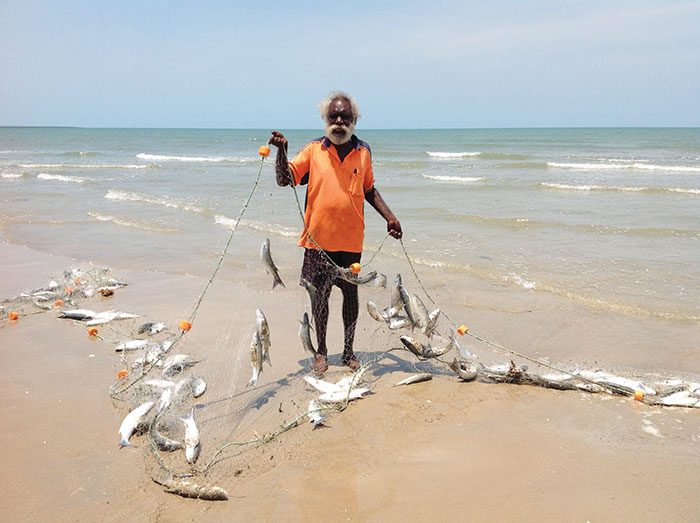 Don Wilton with a great catch at Nardilmuk.
Don Wilton with a great catch at Nardilmuk. Photos: Bawinanga Aboriginal Corporation
By Annabel Boyer
In July 2017 a group of Indigenous fishers from the remote community of Maningrida made their first sale of fish to Darwin – a catch of mullet. The sale was made possible by recent changes to Aboriginal Coastal Licences in the Northern Territory that allow Indigenous fishers to sell their catch into markets beyond their own communities.
Licence changes bring new business and employment opportunities, along with new sources of fresh food for remote communities, many of which struggle to secure high-quality
supplies and adequate protein.
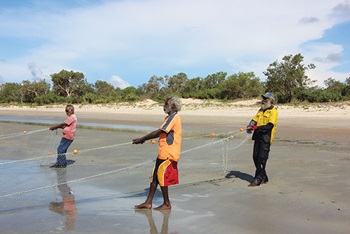 Jimmy Olsen, Stuart Yirawara and Don Wilton pull a net in.
Jimmy Olsen, Stuart Yirawara and Don Wilton pull a net in. 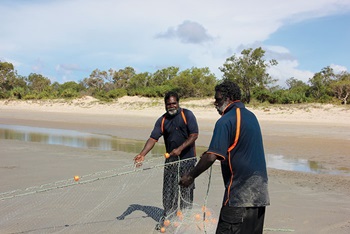 Gavin Ankin and Hans Lawrence catch some fish.
Gavin Ankin and Hans Lawrence catch some fish. 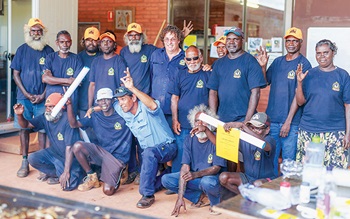 Graduation ceremony for the Certificate II in Fishing Operations delivered by Chris Francis from the Australian Maritime and Fisheries Academy supported by Klaus Jeffrey from NT Fisheries.
Graduation ceremony for the Certificate II in Fishing Operations delivered by Chris Francis from the Australian Maritime and Fisheries Academy supported by Klaus Jeffrey from NT Fisheries.The High Court’s 2008 Blue Mud Bay decision was the catalyst for the licence changes. It recognised that indissoluble, communally held ‘Aboriginal Land’ extended to the mean low-water mark. Access to the area between low and high tide, known as the ‘intertidal zone’, is now regulated by traditional owners and the relevant land council.
Negotiations over access subsequently revealed the depth of interest in commercial fishing operations in coastal Indigenous communities.
The Northern Territory Government committed to changes to coastal fishing licences in the wake of the Blue Mud Bay decision and these came into effect in 2015. By late 2016 local communities were beginning to act on the new opportunities.
Licence changes
Previously, just one licence was available in each Indigenous community and the catch could only be sold within that community. Now there can be more than one licence holder and the catch can be sold commercially to markets further afield.
The total allowable catch for each licence is five tonnes a year, but no one has so far reached that limit. Licence holders can target mullet, Blue Threadfin, queenfish, Milkfish, trevally and reef fish such as cod, parrotfish, Coral Trout and snapper.
Licence holders cannot target managed species, such as barramundi, Spanish Mackerel, King Threadfin, Mud Crab or Sea Cucumber (although allowances are made for incidental catch), and cannot fish in reef-fish protection areas.
The new licences also allow fishers to combine traditional fishing practices and modern techniques. As well as net and line fishing methods, traditional fish traps can be used, along with scoop nets, hand lines and hand spears. Allowable net lengths have been increased from 16 to 100 metres.
At Maningrida, 500 kilometres east of Darwin, there are now three fishers with Aboriginal Coastal Licences – Don Wilton, Stuart Yirawara and Jimmy Olsen.
Don Wilton says he fishes three days a week, taking seven or eight of the younger members of the community out with him. He acts as a mentor for their entry into the seafood industry and the boys are encouraged to participate in the Community Development Program fishing activity, which provides small increases to their welfare payments in exchange for participation.
Across the Northern Territory, from Borroloola in the east to Wadeye in the west, there are about 20 licences operating. Aboriginal coastal licence holders in Wadeye, the Tiwi Islands and Nhulunbuy are supplying their local markets while also looking to increase catches and expand sales.
However, doing so is not just a matter of catching more fish. Remoteness and lack of infrastructure make storage difficult, and meeting market requirements, packaging and logistics make it a challenge to establish consistent supply of product.
Remote challenges
Fundamental issues that come with remoteness include availability of materials and the lack of reliable essential services.
Currently, the Maningrida fishers transport their fish to market in the equivalent of a one-tonne esky. With funding from the Northern Territory Government, two shipping containers have been fitted-out to help the fishers. One has a dedicated ice machine. The other has been modified for fish processing, and meets the accreditation requirements to process fish for sale. Processing of fresh catch and is expected to begin this year.
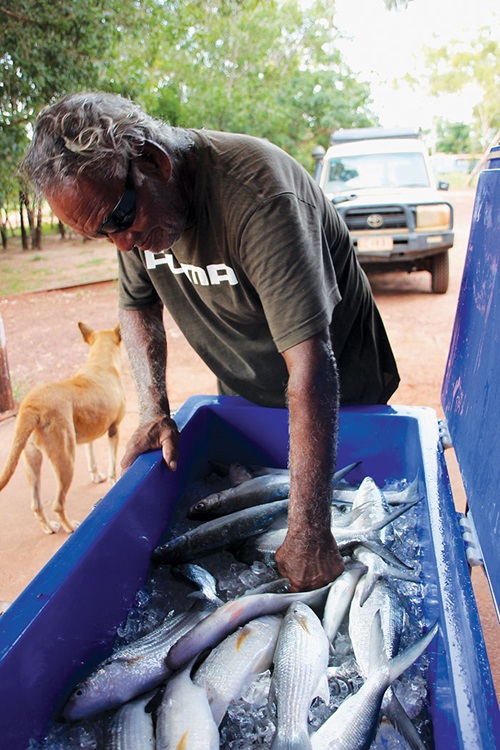 Jimmy Olsen sells Mullet at the Thursday night market.
Jimmy Olsen sells Mullet at the Thursday night market.Clément Bresson is the enterprise development manager for the Bawinanga Aboriginal Corporation in Maningrida, which has been providing support to the community’s fledging commercial fishing operations.
“Sending the fish by road in the dry season is straightforward, and we are able to sell to neighbouring communities, but during the wet season these roads are closed, requiring us to barge our catch to Darwin. This takes up to four days and makes it a lot harder,” he says.
He says selling to local communities is definitely the preferred option for Maningrida fishers: “Community members love buying fresh fish; the support has been very good.”
The manager of aquaculture and Aboriginal business development for the Northern Territory Department of Primary Industry and Resources, Matt Osborne, says the increasing number of licences has had a positive impact on community cohesion.
“More licences have resulted in a culture of collaboration, with fishers working together to fish,” he says.
Fresh food
Fish have been sent from Maningrida to Darwin twice, with more shipments planned. But a higher priority for many is the opportunity to provide more fish to remote communities as a source of healthy and fresh protein. So far, the communities of Gunbalanya and Ramingining have received Maningrida catch.
“There is a lot more market need in those remote communities than in Darwin, as many remote communities are too far from the coast to catch their own fish, and have a need for fresh and affordable sources of protein,” Matt Osborne says.
While doing this is still some way off, Matt Osborne says there are already tangible benefits occurring in communities where the Aboriginal Coastal Licences are active.
“Both anecdotally and from logbook returns we can tell that more fresh fish is being sold in these communities. The availability of fresh and affordable fish is an extremely positive development.”
Sharing the costs of the new equipment and fuel required for the increase in fishing effort has been important in helping the fledgling fishing businesses to develop, establish and thrive. A joint approach has also helped to make the most of other resources, such as mentoring opportunities, infrastructure and administrative support, as the fishers work their way towards becoming independent, sustainable and financially viable operators.
The Bawinanga Aboriginal Corporation has provided important support in these areas, including help with grant applications. Matt Osborne says Northern Territory Fisheries is keen to replicate the model of support and fishing established within the Maningrida community.
Support and training
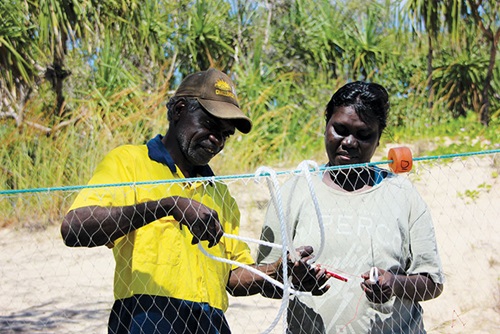 Jack Doolan and Sonia Kurrkmarra practise net mending.
Jack Doolan and Sonia Kurrkmarra practise net mending.Northern Territory Fisheries manages the Aboriginal Coastal Licences and also delivers two support programs, the Aboriginal Fishing Mentor Program and the Indigenous Marine Training Program. Matt Osborne says the mentorship and training programs are just as important as the changes to the licence.
Indigenous Northern Territory Fisheries officers act as mentors to help fishers learn how to operate commercially in their communities, including how to maintain gear, how to process and store catch, and how to comply with fisheries regulations.
The Indigenous Marine Training Program formalises the skills and training provided through the delivery of nationally accredited training to participants. More than 45 participants have completed a Certificate II in Fishing Operations, which is delivered by Northern Territory Fisheries in partnership with the Northern Territory Department of Trade, Business and Innovation and the Australian Maritime and Fisheries Academy. The success of the program saw it awarded the 2017 National Seafood Industry People Development Award.
Many of those who fish with licence holder Don Wilton will soon complete a filleting course in preparation for getting processing underway in the community. Don Wilton completed that same course in 2015.
Clément Bresson says the licence changes are bringing positive changes for people in the Maningrida community, who are excited to be accessing their resources.
“It is providing people with the opportunity to learn and take a further step towards applying for commercial licences. There is pride in the fishers and in the community in their fishers. By helping people to supplement their income and provide fresh fish it helps them to stay on country,” he says.
More information
Matt Osborne, Northern Territory DPIR
08 8999 1488
matthew.osborne@nt.gov.au
Clément Bresson, Bawinanga Aboriginal Corporation
08 8979 6560
clem.bresson@bawinanga.com





